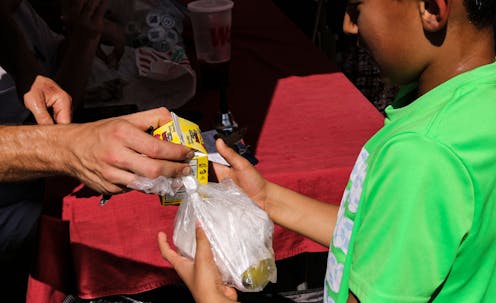Students from struggling economic backgrounds sent home with food for the weekend have improved test scores, study finds
- Written by Michael Kurtz, Associate Professor of Economics, Lycoming College

The Research Brief[1] is a short take about interesting academic work.
The big idea
When food banks work with schools to send children home with a backpack full of food over the weekend, they do better on reading and math tests, I found in a recent study[2]. These effects are strongest for younger and low-performing students.
In the peer-reviewed study[3] published in December 2020, my co-authors – Karen Conway[4] and Robert Mohr[5] – and I explored how weekend feeding programs, also known as “backpack” programs, affected end-of-grade tests in reading and math for third, fourth and fifth graders in North Carolina. These types of programs began independently in 1995 in a single school in Little Rock, Arkansas. Since then, Feeding America – a national network of food banks – has created its BackPack Program[6] to help students “get the nutritious and easy-to-prepare food they need to get enough to eat on the weekends.” The program now serves more than 450,000 students annually[7].
Each Friday, students enrolled in the program are given a bag of mostly nonperishable food at school to help nourish them through the weekend. The packs typically consist of grains, fruits and vegetables, some sort of protein and milk.
We used BackPack Program data from a Feeding America food bank in North Carolina and student data from the state. This allowed us to compare how economically disadvantaged students – those most likely to enroll in the program – performed on math and reading tests before and after the program was adopted at their school.
We then compared this with the performance of all other students at the same school and with that of economically disadvantaged students at schools that had a similar percentage of economically disadvantaged students but nevertheless did not participate in the BackPack Program.
Our analysis shows economically disadvantaged students at schools that adopt a BackPack Program improve their reading and math scores by an amount similar to that of students at schools[8] that adopted a school breakfast program[9].
Adoption of a BackPack Program appears to shrink the gap in test scores between economically disadvantaged and advantaged students by about 15%. We also show the program is more effective for the youngest students in our study – third graders – and for students with the lowest test scores.
Why it matters
Weekend feeding programs fill a gap in many economically disadvantaged students’ nutritional needs between school lunch on Friday and school breakfast on Monday. In the United States, 6 million[10] children live in a household where at least one child is food insecure. Approximately 540,000[11] of those live in households that report very low food security – that is, where children are not eating or not eating enough because there was not enough money for food.
Local food banks operated by Feeding America work with schools and community members to identify the most needy students and make sure they have enough food for the weekend.
The food bank is able to provide these food packs at a cost of approximately US$5 per student per week. This suggests the program is a cost-effective way to decrease hunger and improve academic outcomes.
What still isn’t known
There are many different kinds of weekend feeding programs with different goals, funding and community support. They may have different criteria for who can participate. The food packs may be distributed differently or contain different amounts or types of food. Some programs target the entire family[12] rather than a single student. Some organizations may actively seek out partnership with certain schools. Others may wait for motivated administrators or community members to initiate the program. It is not yet known how the effect of weekend feeding programs may be different under these varied circumstances or in different areas of the country.
What’s next
My co-authors and I have begun work on understanding the factors that lead a particular school to adopt a BackPack Program in the first place. We think that understanding how the program spreads will help researchers better understand the effect of the program itself.
[Get the best of The Conversation, every weekend. Sign up for our weekly newsletter[13].]
References
- ^ Research Brief (theconversation.com)
- ^ recent study (doi.org)
- ^ study (doi.org)
- ^ Karen Conway (paulcollege.unh.edu)
- ^ Robert Mohr (paulcollege.unh.edu)
- ^ BackPack Program (www.feedingamerica.org)
- ^ serves more than 450,000 students annually (www.feedingamerica.org)
- ^ students at schools (doi.org)
- ^ adopted a school breakfast program (doi.org)
- ^ 6 million (dx.doi.org)
- ^ 540,000 (dx.doi.org)
- ^ target the entire family (outofthegardenproject.org)
- ^ Sign up for our weekly newsletter (theconversation.com)

















